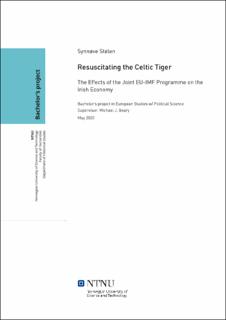| dc.contributor.advisor | Geary, Michael J. | |
| dc.contributor.author | Stølen, Synnøve | |
| dc.date.accessioned | 2021-09-13T16:02:46Z | |
| dc.date.available | 2021-09-13T16:02:46Z | |
| dc.date.issued | 2020 | |
| dc.identifier | no.ntnu:inspera:57494640:30252575 | |
| dc.identifier.uri | https://hdl.handle.net/11250/2775523 | |
| dc.description.abstract | Denne oppgaven gir en kritisk analyse av effektene EU-IMF programmet i Irland, et program som er ansett som en stor suksess av både politikere og akademikere. Oppgaven anvender mixed methods forskningsdesign med empirisk analyse, bestående av en Keynes-modell for å analysere virkningene av makroøkonomiske endringer på økonomisk vekst, en kvalitativ analyse av taler, offisielle dokumenter og uttalelser, pressemeldinger og avisartikler, samt forskning gjort av andre akademikere. Dette danner grunnlaget for en case studie av EU-IMF programmet i Irland for å besvare forskningsspørsmålet: Hvordan, og i hvilken grad, påvirket EU-IMF programmet gjenreisningen av den irske banksektoren og økonomien? Oppgaven argumenterer for at EU-IMF programmet styrket gjenreisningen av den irske økonomien, og spilte en avgjørende rolle i landets retur til økonomisk og finansiell stabilitet. Det vil også argumenteres for at feiltrinn i banksystemet i årene før finanskrisen, samt gjelden fra programmet fortsatte å sinke økonomisk vekst til tross for den formidable gjenreisningen. Et av hovedfunnene i oppgaven er at byrden som ble påført befolkning, gjennom høyere skatter, arbeidsledighet, kombinert med deres egne boliglån sinket gjenreisningen grunnet lavt privat konsum.
Oppgaven konkluderer med at EU-IMF programmet i stor grad påvirket gjenreisningen i Irland, da landet ville vært ute av stand til å klare seg på egen hånd grunnet feiltrinnene i banksystemet før finanskrisen. Det bør imidlertid erkjennes at den internasjonale økonomisk situasjonen akselererte innenlands vekst fra 2014-15. | |
| dc.description.abstract | This dissertation provides a critical analysis of the effects of the EU-IMF Programme in Ireland, a programme which is regarded a huge success by both politicians and scholars. By applying a mixed methods research design of empirical analysis, consisting of a Keynes model to analyse the effects of macroeconomic changes on economic growth, a qualitative analysis of speeches, official documents and statements, press releases and newspaper articles, as well as work of other academics. This forms the basis for a case study of the EU-IMF Programme in Ireland to answer the research question: How, and to what extent, did the EU-IMF Programme affect the recovery of the Irish banking sector and economy? The dissertation argues that the EU-IMF Programme boosted the recovery of the Irish economy and played a pivotal part in the country’s return to economic and financial stability. It will also argue that banking mistakes made in the boom-years and the programme’s debt continued to weigh on growth despite the astonishing recovery. One of the key findings of the dissertation is that the burden imposed on the people, through higher taxation, unemployment, combined with their own mortgages slowed recovery due to low private consumption.
The dissertation concludes on the note that the EU-IMF Programme to a great extent affected the recovery in Ireland, as the country would not have been able to muddle through on its own due to banking-mistakes made in the boom-years. However, it should be noted that the international economic situation accelerated domestic growth from 2014-15. | |
| dc.language | | |
| dc.publisher | NTNU | |
| dc.title | Resuscitating the Celtic Tiger: The Effects of the Joint EU-IMF Programme on the Irish Economy | |
| dc.type | Bachelor thesis | |

